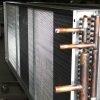The experts at Mainstream love answering your questions. That’s why we decided to start a series devoted to exactly that: your questions answered.
In this inaugural edition, we take a look at some of the most common commercial and industrial HVAC questions we get from clients.
Coil failure.

One of the biggest, most persistent, questions we get is why water, steam, and refrigerant coils fail. Even though coils are meant to last 10 to 15 years, that’s only possible when units are maintained regularly. Most failure is related to dirt build-up, environmental conditions, and faulty system design. In fact, we’ve written an entire in-depth article on the topic.
HVAC life expectancy.
The life expectancy for your unit all depends on how well it is maintained and the amount of work it has to do. We always say that failure will inevitably occur. It’s up to you to expend that lifespan as long as possible. Typically, HVAC systems last anywhere between 15 to 25 years. Improvements in technology are certainly helping push that number up even further.
Covid and ventilation.
Yes, proper ventilation is widely considered one of the key ways to prevent the spread of Covid-19. HVAC systems have a lot to do with this. It’s important to ensure systems are functioning as designed, allow for plenty of indoor/outdoor air exchange, and are maintained regularly.
Emergency tube bundle failure.
 While they require little maintenance overall, tube bundles do occasionally fail. The number one reason for this is corrosion, due to external or internal environments. Issues with U-bends, water vapor, and thermal fatigue can also create issues for the tubes. Keeping an eye on the units with periodic professional assessments can go a long way to ensuring their long-term viability.
While they require little maintenance overall, tube bundles do occasionally fail. The number one reason for this is corrosion, due to external or internal environments. Issues with U-bends, water vapor, and thermal fatigue can also create issues for the tubes. Keeping an eye on the units with periodic professional assessments can go a long way to ensuring their long-term viability.
Iced-up units, in the summer.
As the weather heats up across much of the U.S., one common concern is the formation of ice on HVAC units. This can be caused by a number of issues, but usually has to do with thermostats being set too low, worn fan belts, or blocked, dirty, and malfunctioning tubes.
For those paying attention, there is a bit of a theme here.
Maintenance.
This is the number one way you can be sure your units are working properly for the duration of their lifetimes.
Have a specific issue you’d like an answer to? Check out our FAQ page.





